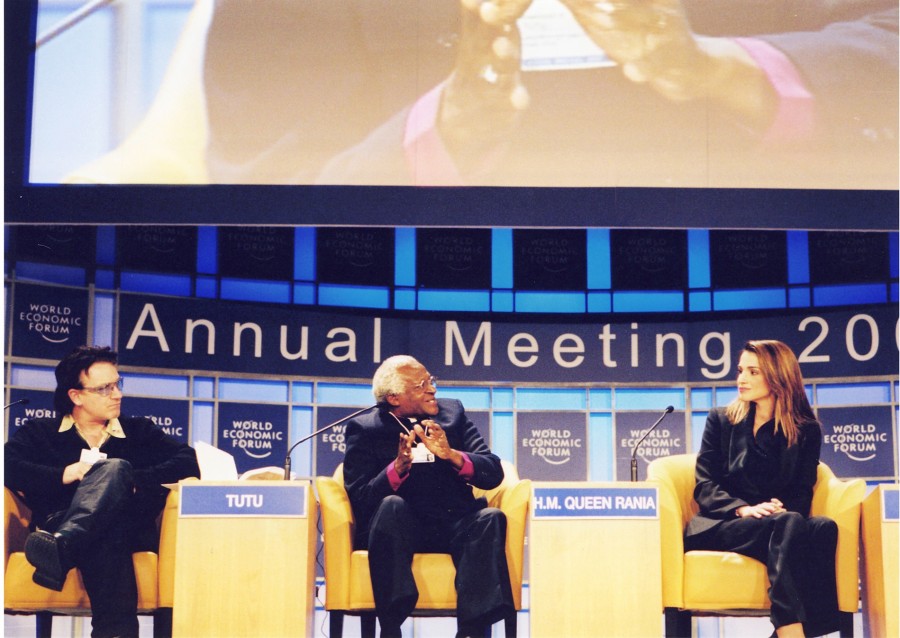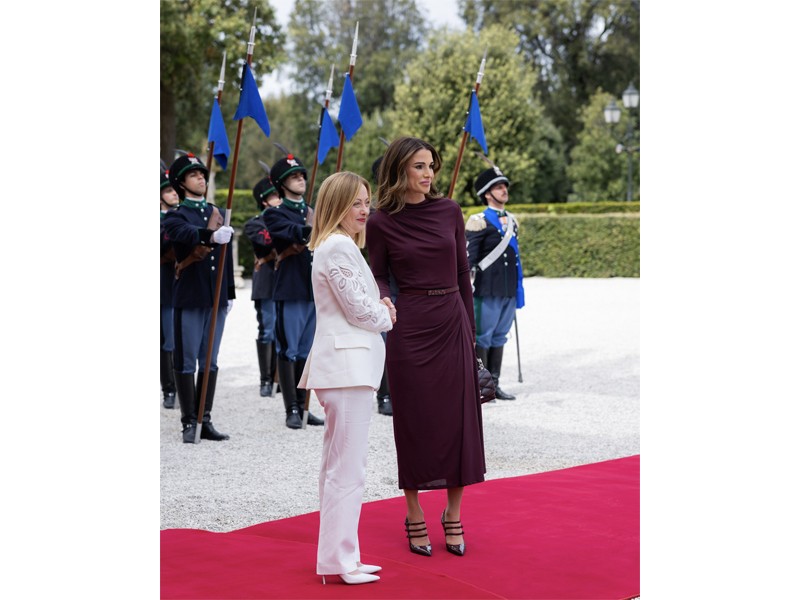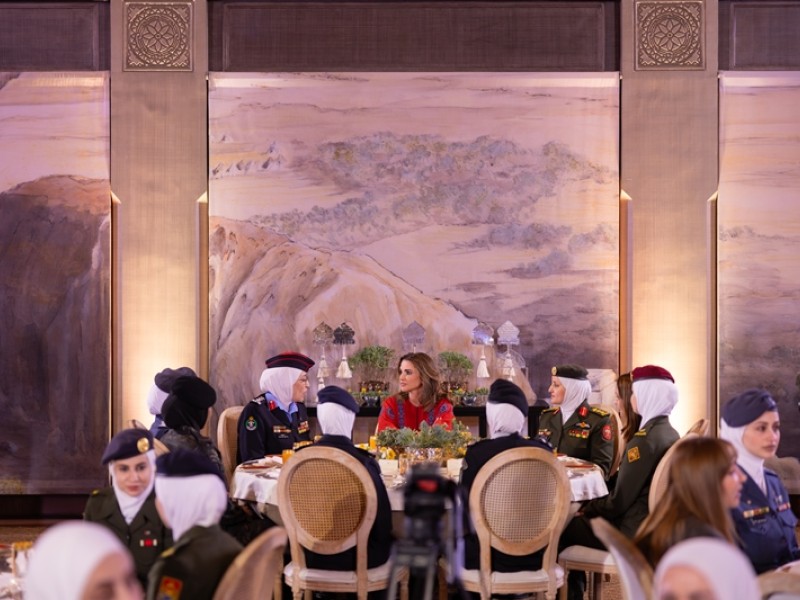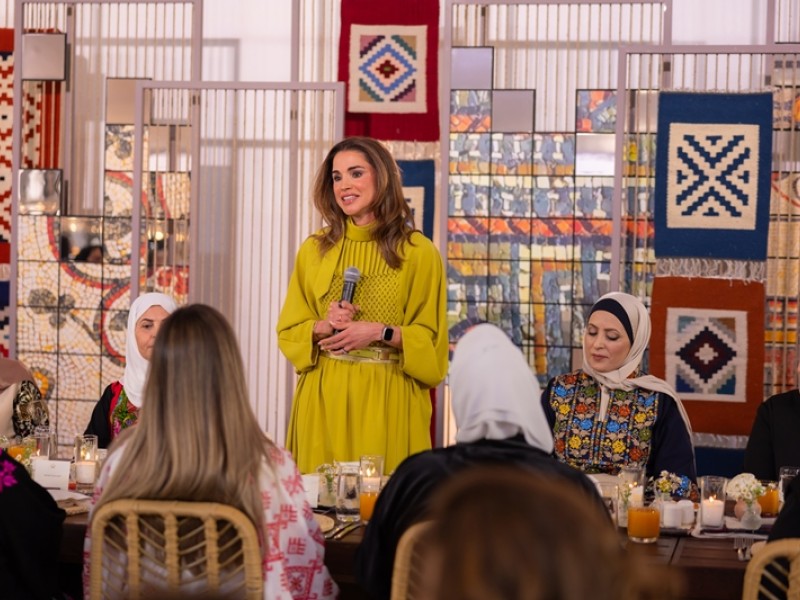Queen Rania Calls for Sustained Cross-Cultural Dialogue

(Office of Her Majesty – Press Department – New York) - Her Majesty Queen Rania Al-Abdullah called for sustained cross-cultural dialogue, including a greater awareness of Islam by the West, and warned of the dangers of a bi-polar view of the world.
On a 4-day working visit to the United States with His Majesty King Abdullah, the Queen's call for sustained communication and dialogue was made at the opening plenary of the Annual Meeting of the World Economic Forum in New York, as well as at a luncheon held in Washington, DC with professional women from different sectors.
Speaking to a 2,000-member audience of government leaders, corporate chiefs, media executives, and representatives of non-governmental organizations from over 100 countries at the World Economic Forum Thursday, Queen Rania said: "There is a danger of a bi-polar view of the world, a subliminal segregation of our world…of 'us' versus 'them.' And that is a very dangerous development…where people look at my part of the world for instance, sometimes they look at it as a homogenous type of society, forgetting that the 1.2 billion Muslims are spread over different countries, regions, continents, speaking different languages, [from] different socio-economic classes," she said.
Dialogue, the Queen added, can help individuals and nations understand the internal dynamics of different civilizations so that they can try to deal with the root causes of some of the world's conflicts.
The Queen also said that many people in the Middle East are facing an "identify crisis" in trying to strike a balance between defining their own identity and participating in the global economy and world.
"Many people of our part of the world feel a battle, they feel that they have an identity crisis, trying to really come to terms with our global world and define their own identity, religion… We're still struggling with that, and we really need to continuously feel a part of the world and come to terms with the issues," Queen Rania said.
Queen Rania's remarks were echoed on Friday when she addressed over 60 professional women from different sectors in the Washington area, including government, Congress, the diplomatic corps, the business community, academia, media, non-profit organizations, and the arts.
"This dialogue that we find ourselves engaged in is not only healthy, but it is absolutely crucial. It is important because unless we succeed in understanding--in depth and with sophistication--the complexities and nuances of our different, yet similar, worlds, and unless we frame such understanding within an intelligent historical context, I am afraid we will be in danger of widening the gap and of inflicting further injustice on humanity," the Queen warned.
Friday's lunch was organized by the Middle East Institute, a think tank based in Washington, DC, which aims to increase Americans' knowledge and understanding of the Middle East through program activities, language courses, and an academic journal.
The Institute also provides policymakers and the media with an in-depth analysis of current events in the region.
In introducing the Queen at the luncheon, the Institute's President Edward Walker characterized Jordan as a "great friend and ally." "I cannot think of a better representative to change some of the stereotypes, what some of the people think about the Arab World and who the Arabs are, than Queen Rania," he said.
Walker, a former US Ambassador to several countries in region, met with Queen Rania in Amman last October.
Also at the luncheon, the Queen shared Jordan's success in communicating its message to the world and being able to integrate in the global economy, including joining the WTO in record time, signing the Free Trade Agreement with the US, establishing IT community centers, computerizing education, and public-private sector partnership.
"We have chosen not to find excuses to cocoon ourselves," the Queen told the audience, urging them to support Jordan in their own specific fields.
In addition to her remarks on dialogue, the Queen also spoke at the World Economic Forum's opening plenary about the role of superpowers in the world, stating that powerful nations nowadays have an opportunity to "do good for mankind" by moving away from their traditional role of putting their interests above all else.
The United States, the Queen added, is now "expected to exercise its moral authority to make sure that there is equality in the world…to use the tools available to it to ensure equity."
"This ability to make such a large impact on the world should be used as an opportunity rather than a responsibility. I believe that the United States does have a good opportunity to make the world a better place," the Queen said.
Queen Rania also reaffirmed the important role that the international community can play in bringing about a long-term solution to the Middle East peace process, and called for an "increased engagement" in the region and the strengthening of the peace camp on both sides.
Describing the current situation in the Arab-Israeli conflict as "a very dangerous situation" and likely the "most dangerous it's ever been," the Queen said that both parties should be encouraged to choose dialogue over violence.
"We really need to be able to encourage the two parties…to try to think of alternative ways to help them think of alternatives. We need to encourage them to change their discourse and to try to occupy the higher moral ground," she said, adding that the peace camps on both sides of the conflict, which have been marginalized, should be strengthened and "given a voice."
Also speaking at the opening plenary--held under the theme "For Hope"--were Philippine President Gloria Arroyo, South African Archbishop Emeritus Desmond Tutu, Afghanistan's interim foreign minister Abdullah Abdullah, Professor Elie Wiesel of Boston University, and world-famous rock star Bono.
Most of the discussion on the panel, which was moderated by Charlie Rose, host of the PBS program,'The Charlie Rose Show,' focused for the most part on the opportunity that developed countries have to limit violence and terror around the world by bridging the gap between the 'haves' and the 'have-nots.'
Participants in this year's 5-day meeting, which carries the theme "Leadership in Fragile Times: A Vision for a Shared Future," will mobilize forces to re-energize the global economy, and to exchange lessons learned from the past in order to better tackle the multifaceted challenges of the 21st century.
The Queen also met for the third time with US First Lady Laura Bush at the White House.
Common interests between the two First Ladies include early childhood development and education.
Featured
Queen Rania's official website
This website does not support old browsers. To view this website, Please upgrade your browser to IE 9 or greater
Your browser is out of date. It has known security flaws and may not display all features of this and other websites. Learn how to update your browser



